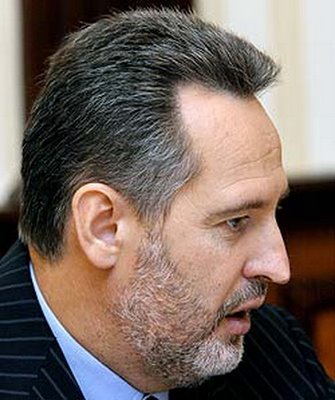 Article 19 welcomes High Court’s decision to dismiss the defamation claim brought by the Ukrainian businessman Dmytro Firtash (left) against the Kyiv Post, an independent Ukrainian newspaper.
Article 19 welcomes High Court’s decision to dismiss the defamation claim brought by the Ukrainian businessman Dmytro Firtash (left) against the Kyiv Post, an independent Ukrainian newspaper.
Oligarch against Ukrainian newspaper
On 22 November 2010, Ukrainian oligarch Dmytro Firtash filed a claim with the High Court in London against four defendants: the Kyiv Post publisher, owner, chief editor and the author of an article which Firtash claims to have damaged his reputation in the UK. The article in question, published in July 2010, discusses the outcome of an international arbitrage concerning a dispute between RosUKrEnergo, of which is Firtash is a major owner, and the Ukrainian national gas company and Government.
This is the second time that the Kyiv Post is being sued for defamation in the UK in relation to a published investigative journalism piece.
“Today’s court decision is an important victory in the battle against libel tourism given the prominence of British courts in this phenomenon” said Agnes Callamard, Executive Director of Article 19.
“Libel tourism” – a term coined to describe the practice of forum shopping for laws and courts that are particularly plaintiff-friendly – has emerged as a serious transnational threat to free speech. Given the dramatic chilling effect of such libel laws and the prominence of British courts in this phenomenon, British free speech activists are concerned by this phenomenon.
Matter did not relate to the UK
”We congratulate the Kyiv Post on their victory and call on the UK government to change English defamation laws,” said Callamard.
Master Leslie – the High Court judge who heard the arguments – decided that Dmytro Firtash’s connections to the UK were “tenuous in the extreme.” He found the businessman neither resides nor currently has business affairs in the UK. He also ruled that the subject matter of the allegedly defamatory article did not relate to the UK. Finally, the judge found procedural defects in the service of the claim on the Kyiv Post.
Article 19 campaigned in support of Kyiv Post and against libel tourism, the practice of foreign plaintiffs to look for jurisdictions where their libel claims are more likely to get a favourable result.
To coincide with the pre-trial hearing of the case against, Article 19 held a silent protest outside the Royal Court of Justice on 24 February to highlight the silencing effect the increasing use of UK courts has on investigative journ alism in countries, including Ukraine.
alism in countries, including Ukraine.
“The support by Article 19 was very important for us”, comments Brian Bonner, the chief editor of Kyiv Post.
“We are very thankful for their action of solidarity and for standing for free expression.” Mark Stephens, of Finers Stephens Innocent, who represented the Kyiv Post said, “This is one of the worst cases of libel tourism I’ve encountered in recent years. This is a dispute between a Ukrainian oligarch and a Ukrainian paper about matters in the Ukraine. It has no connection with the UK and the learned Master Leslie quite rightly threw the case out. Forum shopping in libel cases have become the scourge of the British legal system.
Freedom of expression in Ukraine
Despite some recent legal improvements, such as decriminalization of defamation and the adoption of an access to information law, both law and practice are in violation of international standards on freedom of expression.
The state television in Ukraine is controlled by the government through the broadcasting sector regulator, the National TV and Radio Broadcasting Council. After the last presidential elections, state television news mentions the authorities solely in a positive light. Opposition political leaders have restricted access to air time. In such circumstances, defamation cases against the remaining few independent media outlets worsens the situation in the country and freedom of expression remains under growing threat.
Frequent result – bankruptcy for media outlets
“The UK – with its democratic values and traditions – should not be a place where rich and powerful Ukrainian oligarchs come to silence and retaliate against the criticism made against them. In countries such as Ukraine, free media is already in a vulnerable situation. Article 19 strongly condemns using UK courts to silence critical voices abroad,” said Callamard.
Although not a new phenomenon, “libel tourism” is gaining traction and putting greater pressure on the free exchange of ideas worldwide. The combined effects of the rules on jurisdiction and of global publication on the internet with the UK’s image as a paragon of high jurisprudential standards makes UK courts an attractive venue for overseas plaintiffs seeking to silence critics in their home countries.
In addition, these types of court cases have dire financial implications for the media outlets, as they have to not only pay the damage, but also for the court proceedings in London. In some cases these sums exceed £100.000, which often results in bankruptcy for media outlets.
Time to change libel law
“Our libel laws allow people accused of funding terrorism or dumping  toxic waste in Africa to silence their critics whilst ‘super-injunctions’ stop the public from even knowing that such allegations exist. We need to reform our libel laws now, and that’s why we’re launching a national campaign to persuade our politicians to do so,” said Jonathan Heawood, Director of English PEN.
toxic waste in Africa to silence their critics whilst ‘super-injunctions’ stop the public from even knowing that such allegations exist. We need to reform our libel laws now, and that’s why we’re launching a national campaign to persuade our politicians to do so,” said Jonathan Heawood, Director of English PEN.
“If we don’t act we’re at risk of becoming a global pariah. There are US States who view English libel law as so damaging to free speech they have passed laws to effectively block the decisions of English judges. Our report is an important milestone in modernising our antiquated and chilling approach to free expression,” sais John Kampfner, the CEO of Index on Censorship.
Sign petition!
Here you sign the national petition to libel reform. The campaign is initiated by the Index on Censorship, English PEN and Sense about Science. Initiative’s aim is to campaign to reform the libel laws of England and Wales.
More than 55’000 people have already signed the petition.
Contacts
For more information please contact: Boyko Boev, Legal Officer, atboyko@article19.org or at +44 20 7324 2500.
Related articles:
London Judge Dismisses Firtash Lawsuit Against Kyiv Post (Kyiv Post)
Human Rights House’s articles:
Ukraine: Access to information law adopted
Ukrainian Parliament urged to adopt law on access to public information
Article 19 welcomes resolution on Ukraine’s democratic development
Attacks on journalists in Belarus, Ukraine and Russia – attacks on freedom of expression?
ARTICLE 19 and IMS call on new President of Ukraine to stand for freedom of expression
Five billion people in the world have the right to information


